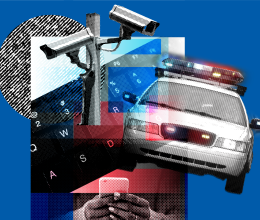Chairman Ghanbari, Vice Chair Plummer, Ranking Member Thomas, and members of the House Homeland Security Committee:
My name is Patrick Higgins, and I have the pleasure of serving as Policy Counsel at the ACLU of Ohio. Thank you for the opportunity to present testimony in support of House Bill 29.
The ACLU of Ohio Supports House Bill 29 because it is a step in addressing flaws in how our state imposes driver’s license suspensions. Simply put, this is smart policy in that it recognizes that people who owe child support oftentimes need to drive in order to earn money. Restricting a person’s mobility for wholly unrelated offenses is antithetical to a legal system where all Ohioans can prosper.
As House Bill 29’s sponsors pointed out, Ohio’s current driver’s license suspension penalties set many of our neighbors up to fail because such penalties quickly become insurmountable to people who need to get to work, to their doctor, and to the grocery store. We live in an Ohio where 82% of us drive to work and only 1.4% rely on public transit1. The time for the change contained in House Bill 29 is now, and I encourage you to support it.
While House Bill 29 is a step in addressing flaws in our current system, there remains more to be done. It is for this reason that I encourage you to consider the following changes to improve this important legislation:
- Incorporate Senate Bill 37 into House Bill 29 by continuing to untangle our state’s counterintuitive driver’s license suspension practices. Senate Bill 37 sets out to do the following:
- Removes the possible penalty of a driver’s license suspension for any drug offense in which the highest degree of penalty is a misdemeanor as well as felony drug offenses where the defendant pleads guilty to an offense that is not the highest
degree of felony imposed for that offense2. - Authorizes child support obligors to terminate their suspensions and gain driving privileges through the same mechanisms as in House Bill 29.
- Removes driver’s license suspensions or denial of the opportunity to obtain a driver’s licenses as possible penalties for a student who is habitually truant from school.
- Alters the lookback period from five years to one year for financial responsibility penalties.
- Eliminates the suspension of motor vehicle registration rights and impoundment of a motor vehicle’s certificate of registration and license plates as penalties for operating a motor vehicle without proof of financial responsibility.
- Removes the possible penalty of a driver’s license suspension for any drug offense in which the highest degree of penalty is a misdemeanor as well as felony drug offenses where the defendant pleads guilty to an offense that is not the highest
- End the state’s use of debt-related driving restrictions.
- Ohio is among a shrinking number of states using debt-related driving restrictions. This number is shrinking because of a growing recognition that millions of people nationwide are struggling to survive with debt-related driving restrictions just because they could not afford a court fine or fee or because they missed a court hearing3. We know that these suspensions are counterproductive to improving collection outcomes4. We also know that the heaviest weight of this ineffective policy falls most heavily on communities where people of color make up more of the population5.
You have a unique opportunity in this moment of time, General Assembly, and Committee. Over the course of years, Ohio has been slowly untangling the quagmire of driver’s licenses suspensions in a way that gets more of us right with the law and on the road to health, education, family, and work. House Bill 29 is the right vehicle for these important changes, and I encourage you to keep driving. The ACLU of Ohio stands ready to be of assistance in improving this legislation, and I am happy to answer any questions that you have.





